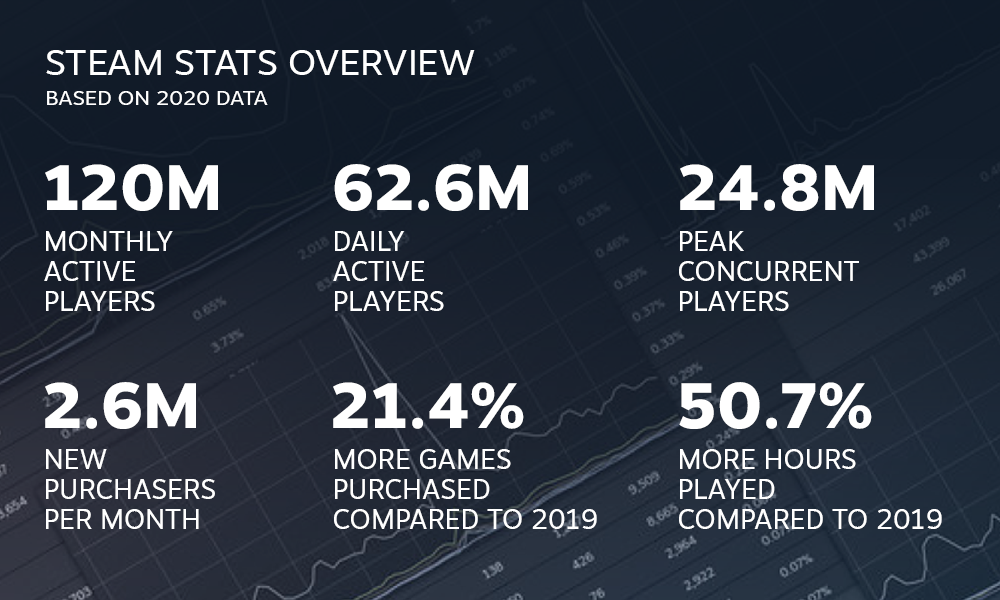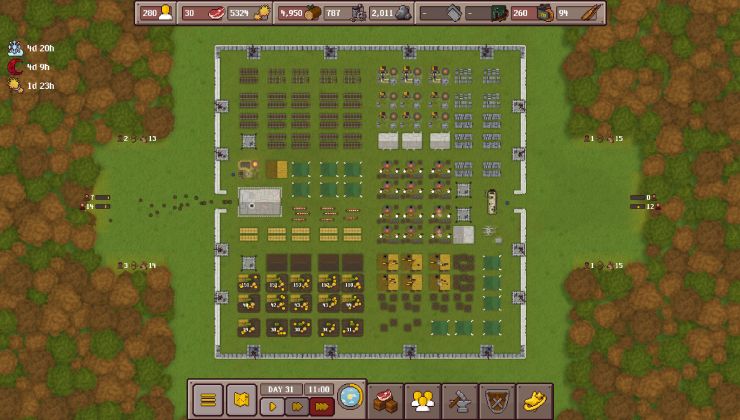With 2020 done and out the way, Valve have put up a 'Year in Review' post highlighting a bunch of facts about what people were doing on Steam and some of the numbers are pretty surprising.
Going over their past Year in Review posts for 2018 and 2019, it shows that Steam is growing nicely. 2018 saw 90 million monthly active users, 2019 saw 95 million monthly active and 2020 jumped a lot up to 120 million monthly active users. That's a pretty huge jump for one year, likely down to the COVID-19 lockdowns across various countries.
To put that into some perspective for the Linux side of things. If we take the December 2020 Linux user share on Steam as reported by the Steam Hardware Survey (0.78%) that gives us a figure of about 939,120 Linux monthly active users - which we note at the bottom of our Steam Tracker. Quite close to 1 million then!
Is Linux growing then? Well, obviously yes it is overall but not dramatically so - more of a slow and steady build up. If we take the 2018 numbers of 90 million, with the Linux share back in December 2018 of 0.82% it would have been 738,000. So we've added around 201,120 users between Dec 2018 and Dec 2020. None of that is exact of course, we're guesstimating based on the share Valve gives out in their surveys.
Linux and the Steam Play Proton compatibility layer got a mention too which is always good to see:
Throughout 2020, work continued on Steam Play and extending Proton, our runtime for seamlessly running existing Steam games on Linux without additional developer work. We released Proton 5, which supported many new games, improved performance, and introduced support for DX12 and EA Origin games on Steam. For a full list of changes, see our changelog.
We also saw an increase in developers engaging with Valve for early Proton testing during their game development, and fixing Proton-specific issues post-release. All in all, this resulted in exciting new releases this year such as DEATH STRANDING, Horizon: Zero Dawn, and Cyberpunk 2077 being playable on Linux at or shortly after release.
It's still amazing that Valve do actually put all this effort in for Linux with Proton, and all their other contracted developers to work on other parts of Linux from GPU drivers to the new container runtime system. Lots going on for Linux overall when it comes to gaming.
Looking to the future for Linux, Valve stated their clear intention to continue supporting Linux and not just with what's already mentioned. They said they're "putting together new ways for prospective users to get into Linux gaming and experience these improvements" - which sounds pretty exciting. What do you think Valve are cooking up to further Linux gaming? After all, I've long said they must have some real goals with all this work since Steam Machines / SteamOS didn't go far.
Through 2020 the Steam store expanded a bit too through features like the Points Shop, Text and Chat Filtering systems for both the Steam community areas and for developers to use in their games, the News Hub, support for Subscriptions and more.
VR seems to be doing quite well too, with Valve seeing 1.7 million first-time users of SteamVR through 2020. Valve has also been regularly pushing out upgrades to SteamVR and it's steadily become much more stable. On the subject of hardware, they saw a 66.6% increase in gamepad use over 2019 - showing to developers that well tested gamepad support can often be essential.
All in all, a really big year for Valve and Steam. You can see their full post here with lots of details.
It was a great year for Proton too. I suspect Proton 6.0 is probably just around the corner. Looking forward to that.
Hopefully last month's blip in the market share stats for Linux goes back the other way at the end of this month and we see Linux continue it's slow trend of climbing upwards in the stats. That plus Steam coming to Chrome OS some point soon should give Linux a healthy boost on Steam. Which will further encourage developers to pay more attention to Linux when releasing games on PC.
All good stuff, everything is heading in a positive direction, steady as she goes. :)
Last edited by gradyvuckovic on 13 Jan 2021 at 10:13 pm UTC
What do you think Valve are cooking up to further Linux gaming?
Personally I think we will see a continued and (hopefully) increased engagement of Valve to further develop Proton, so that it will run Windows games, even newly released ones, without Linux users noticing any difference whatsoever. I suppose getting all this anti-cheat
The above hope is based on the realization, that we might not like, but have to accept, that native Linux ports of AAA titles are dead. If I am not totally mistaken, Crusader Kings III was the only AAA title we got in all of 2020. Aspyr and Feral both have moved on to other things. Interest in Linux from big brand publishers is still zero and very likely will remain so. At least as far as AAA titles go, Proton and Linux gaming are the same thing these days.
I have few doubts that soon, this year probably, we'll have a financial/economic crisis of epic proportions; something to make the Great Depression feel like an appetizer. It'll be interesting to see how it affects the software landscape.
I have few doubts that soon, this year probably, we'll have a financial/economic crisis of epic proportions; something to make the Great Depression feel like an appetizer. It'll be interesting to see how it affects the software landscape.
Off-topic, but I wonder why you think that would happen, when there isn't the slightest indicator of a collapsing major economy anywhere on Earth. Despite almost a year of pandemic and lockdowns, the US unemployment rate is hovering below 7%. Yes, we have seen massive shifts in employment away from restaurants and entertainment sectors towards...well...Amazon and food delivery services, really. New jobs have been created while others got lost. Yes, some people still got hit hard, and I don't want to sugarcoat that. But many countries in Europe and elsewhere would be happy to have JUST 7% unemployment even WITHOUT a pandemic going on, so there is that.
And while governments racked up huge deficits in 2020, at the same time, interest rates are so dirt cheap right now, that it matters very little. With near zero interest rates, chances of state bankruptcy of any major economy are a good approximation to zero.
Even the housing market is super healthy. The pandemic made many people re-think the appeal of density (I guess it must suck being ordered to stay home in a tiny apartment that's designed to be just a place to sleep). And the lack of opportunity to waste money on bars, restaurants and related activities has left people at the higher income brackets with MORE money to spend because of the pandemic, not less. So there is a significant demand for better and larger housing, again contributing to a robust housing sector.
TL/DR: Not going to happen.
I have few doubts that soon, this year probably, we'll have a financial/economic crisis of epic proportions; something to make the Great Depression feel like an appetizer. It'll be interesting to see how it affects the software landscape.
Off-topic, but I wonder why you think that would happen, when there isn't the slightest indicator of a collapsing major economy anywhere on Earth. Despite almost a year of pandemic and lockdowns, the US unemployment rate is hovering below 7%. Yes, we have seen massive shifts in employment away from restaurants and entertainment sectors towards...well...Amazon and food delivery services, really. New jobs have been created while others got lost. Yes, some people still got hit hard, and I don't want to sugarcoat that. But many countries in Europe and elsewhere would be happy to have JUST 7% unemployment even WITHOUT a pandemic going on, so there is that.
And while governments racked up huge deficits in 2020, at the same time, interest rates are so dirt cheap right now, that it matters very little. With near zero interest rates, chances of state bankruptcy of any major economy are a good approximation to zero.
Even the housing market is super healthy. The pandemic made many people re-think the appeal of density (I guess it must suck being ordered to stay home in a tiny apartment that's designed to be just a place to sleep). And the lack of opportunity to waste money on bars, restaurants and related activities has left people at the higher income brackets with MORE money to spend because of the pandemic, not less. So there is a significant demand for better and larger housing, again contributing to a robust housing sector.
TL/DR: Not going to happen.
In which Country?
Valve's work for Linux can't be praised highly enough.Dunno about this year. These things always come slower than you expect.
I have few doubts that soon, this year probably, we'll have a financial/economic crisis of epic proportions; something to make the Great Depression feel like an appetizer. It'll be interesting to see how it affects the software landscape.
In the medium term, I see two and a half basic drivers: Inequality, climate change, and finance (the 1/2).I have few doubts that soon, this year probably, we'll have a financial/economic crisis of epic proportions; something to make the Great Depression feel like an appetizer. It'll be interesting to see how it affects the software landscape.
Off-topic, but I wonder why you think that would happen, when there isn't the slightest indicator of a collapsing major economy anywhere on Earth.
Nearly all the major developed economies have been gradually increasing inequality--some more than others, some from a higher starting point than others, but it's been a general trend. While unemployment has not been very high most places, people who are working and remain very poor, even homeless, continue to grow. Very large numbers don't have the money to weather a financial shock. Economies in very unequal societies tend to be unstable. Something gives sooner or later; crazies with guns storming legislative buildings so they can wander around taking selfies is a relatively minor example.
Climate change--Crop failures, beeg fires, hurricanes and tornadoes, places running outta water. That kinda stuff can cause economic shocks (not to mention war, famine, pestilence and death). It already has. They will get bigger, the question is how fast.
Finance, and financialization--This is really a subset of inequality. It's both a driver of inequality and a way to get around problems inequality causes, such as lack of demand. It has been growing rapidly as a percentage of the total economy, and that's a problem. Basic finance has some uses--basically, lending to and otherwise arranging money for pieces of the economy trying to do real things. But it doesn't take a big portion of the economy to do that, and indeed with modern technology it should be possible to do that with less economic overhead than ever before. But that ain't what's happened; much of the modern financial economy is parasitic, a drag on the real economy even though it's measured as a massive positive amount of GDP. And it has huge amounts of influence over governments and central banks. Things have not changed much for finance since the Great Recession; they're still way overleveraged, greedy and arrogant, sure that if it happens again the central banks will just throw money at them (as they did this year for Covid) and everything will be fine. But the throwing masses of money trick is an ad hoc thing that nobody really understands the consequences of, which means nobody knows when the gimmick might get overplayed and fail to work. The financial system and its houses of cards means that any shock from the first two problems or something else entirely could get hugely magnified.
But I don't know just when any or all of these chickens may come home to roost.
Valve's work for Linux can't be praised highly enough.Dunno about this year. These things always come slower than you expect.
I have few doubts that soon, this year probably, we'll have a financial/economic crisis of epic proportions; something to make the Great Depression feel like an appetizer. It'll be interesting to see how it affects the software landscape.
the future is an imperfect tense right now "would", let's just live the present perfect simple for now.
(I was going to reply with a rather longish post about my opinion on the world economy but this is not the place for that)
Maybe not this article comments section, but we can always open a forum post. It's a delight to read comments very well articulated like the ones from kimyrielle and Purple Library Guy, and I'd also be interested in knowing more about fellow linuxers. As long as it doesn't turn into constant fight and gets disrespectful, of course.
Last edited by Nanobang on 14 Jan 2021 at 2:34 pm UTC
Valve knows the world economy is going to tank and has been positioning themselves as the source for Linux gaming because everyone will be out of work, and no one will be able to afford new Windows or Apple machines.That may very well be an accurate prediction.
Valve knows the world economy is going to tank and has been positioning themselves as the source for Linux gaming because everyone will be out of work, and no one will be able to afford new Windows or Apple machines.
... or games.
But many countries in Europe and elsewhere would be happy to have JUST 7% unemployment even WITHOUT a pandemic going on, so there is that.This comparison is almost meaningless if you ignore relative living standards. An unemployed person in one country might be better off (and contribute more to the economy) than someone working a full time job in another.
They said they're "putting together new ways for prospective users to get into Linux gaming and experience these improvements" - which sounds pretty exciting. What do you think Valve are cooking up to further Linux gaming?VirtualBox on Steam confirmed. Now you'll be able to get "I use Arch btw" achievement and demonstrate it in your profile. True Linux gaming.
It's also very hard to be sure what people are talking about when they say "unemployment"; the most frequently talked about "unemployment" figure refers to people who have lost their jobs, are drawing unemployment insurance, and are known to be looking for work. It does not include people who gave up looking, people who found a "job" with a zero hours contract that is getting them 10 hours/week if they're lucky, people who are "self-employed" at something too marginal to make a living because they can't find a real job, and so on. There are various different unemployment measures, some of which capture much more than others, but none of them really get everything. It's gotten to the point where I take someone talking about jobs a lot more seriously if they skip all that and talk about the labour participation rate--the percentage of the population that is working.But many countries in Europe and elsewhere would be happy to have JUST 7% unemployment even WITHOUT a pandemic going on, so there is that.This comparison is almost meaningless if you ignore relative living standards. An unemployed person in one country might be better off (and contribute more to the economy) than someone working a full time job in another.
That said, until recently the United States did have a high and growing labour participation rate, and even longer term unemployment was quite a ways down. And bizarrely, despite all the damage the bastard did in other ways, with yet more tax cuts for the rich and badly thought out trade wars and so on, Trump could claim some credit for that. As the verrrry slow recovery from the 2009 financial crisis gradually cut unemployment levels, conventional economic wisdom had it that it was time to increase interest rates because low unemployment would cause inflation. Trump wouldn't go for it because it meant basically cutting short the economic expansion just when he wanted to be re-elected. He bullied the Fed into keeping rates low, and to the surprise of many, inflation (and decent wages) did not materialize. Probably because so much of the employment is precarious and virtually none is unionized. So that's actually one good thing Trump did, which a Democrat, or indeed a more conventional Republican, probably wouldn't have done. Probably the only good thing Trump did in his entire term, and even that he didn't do because he knew better than the conventional wisdom but because he was actually too ignorant to be fooled by it, but it had a significant impact.
that native Linux ports of AAA titles are dead. If I am not totally mistaken, Crusader Kings III was the only AAA title we got in all of 2020.
We did get Half-Life: Alyx.
Valve might be sponsoring some work on improving Wayland compositors, since that's where Linux desktop is heading and having good gaming support in them should be important for Valve.
IIRC CodeWeavers started a work on Wayland for wine, so that might be a start for it.
I'm still patiantly await Wayland native Steam client too especially since Chromium got it, so we'll see.














 How to set, change and reset your SteamOS / Steam Deck desktop sudo password
How to set, change and reset your SteamOS / Steam Deck desktop sudo password How to set up Decky Loader on Steam Deck / SteamOS for easy plugins
How to set up Decky Loader on Steam Deck / SteamOS for easy plugins
See more from me